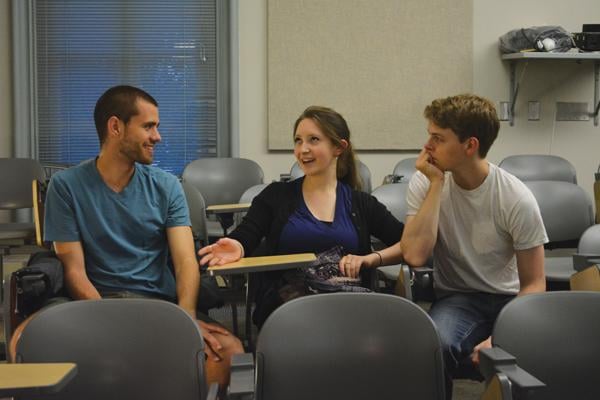
This week marks the first ever Social Justice Week on Northwestern’s campus. As a whole, this event marks a culmination of many groups coming together to discuss concepts of inclusion, diversity and issues of marginalization on campus and throughout the world.
A Social Justice Week was desperately needed. As debates concerning race-related issues and “institutional racism” surfaced throughout this year, I, like many other students, was frustrated with the lack of opportunities to voice my opinion concerning social justice and yearned for outlets to promote campus awareness. For many, this week brings a sense of renewed vigor and openness on campus that has been missing for a long time.
However, as a Jewish student, I was saddened to see two events sponsored by Students for Justice in Palestine that consider Israel a road block to social justice. These two events, “Hafla By the Rock: Nakba Day Commemoration” and the screening of a documentary “Roadmap to Apartheid” are equivalently anti-Israel. By anti-Israel, I mean delegitimizing the Jewish state by making arguments that omit important facts and tell a biased version of historical events.
A flyer I read when I attended the “Hafla By the Rock” event stated, “Nakba commemorates the time during the 1948 war with Zionist forces, when approximately 700,000 Palestinians were expelled from their homeland, hundreds of villages were destroyed.” First of all, this flyer fails to identify that the 1948 war for Israeli independence was fought because five Arab states declared war against the newly United Nations-mandated Jewish state. It also does not mention that Zionists were fighting for their own social justice and that about 6,000 Israelis, many of them recent Holocaust survivors, lost their lives.
“Roadmap to Apartheid” is a documentary that draws comparisons between Israel and South Africa, and explore reasons why many Palestinians believe Israel is an apartheid state. Although members of SJP have claimed openly that their events through Social Justice Week will not be anti-Israel, it is hard to discuss the “Israeli form of apartheid,” as it is described in the film’s trailer, without anti-Israel sentiments arising. Many students on this campus have a deep connection to Israel. The same can be said for students who share the same feeling for Palestine. Social Justice Week should be about bringing these two groups together, not tearing them apart.
By screening a film that describes Israel as an apartheid state, SJP endorses notions the state of Israel has an official policy to exclude, persecute and deny civil rights to Arab citizens that live within its borders. This claim is inherently untrue. Arab citizens of Israel enjoy the full range of civil and political rights, including the right to organize politically, the right to vote and the right to speak and publish freely. In addition, the situations in South Africa and Palestine are incomparable historical situations. Unlike in South Africa, Israel has been subjected to continuous acts of terror through suicide bombings and missile attacks from Palestinian terrorist organizations, necessitating military action and security precautions.
Does Israel take actions that I as a Jewish Northwestern student disagree with? Yes, namely the Israeli settlements in the West Bank which continue to be a barrier in negotiating for peace between Palestinian and Israeli leaders. However, the existence of these settlements does not make Israel an apartheid state.
The desire for social justice in Israel and Palestine should be part of Social Justice Week. Yet, there are no events that address the economic conditions in the Gaza Strip or the injustices the terrorist group Hamas inflicts on Palestinians living under their control. If Israel was not portrayed as the “bad guy” who maintains an apartheid state, maybe a genuine, informed conversation could be had about the real problems facing Palestinians and Israelis.
Members of SJP will argue that they hosted an Interfaith Discussion of Palestine to include both sides of the conflict in their events. Yet, one guest speaker, Rabbi Brant Rosen, supports the boycotting of Israeli goods as economic sanctions against Israel through the boycott, divestment and sanction movement. He is the co-chair of Jewish Voice for Peace, an organization that the Anti-Defamation League has called “one of the top 10 anti-Israel groups.” It is clear that SJP chose a rabbi that holds their same beliefs, not someone who would reflect the perspective of many Jews on campus.
It is unfair to participants in Social Justice Week that they only hear one perspective on the issues in modern day Palestine. The point of this week is to give a voice to all members of the student body and talk about relevant issues in an open and unbiased way. SJP had every right to be included within this week’s programming, yet their inherent anti-Israel values tarnish the true purpose and meaning behind an inclusive and welcoming event. I hope that in the future, SJP recognizes the effects its programming has within the context of Social Justice Week, and that future efforts toward social justice promote dialogues between Jewish and Palestinian students over divisiveness.
Jonathan Kamel is a Weinberg freshman. He can be reached at [email protected]. If you want to respond publicly to this column, send a Letter to the Editor to [email protected].








